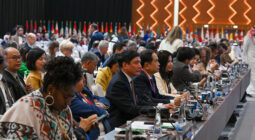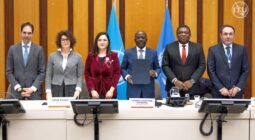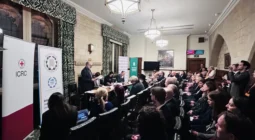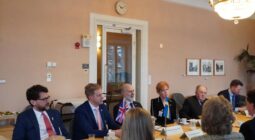

Delegation to Côte d’Ivoire discuss development and the need for closer ties
I am delighted to have led a recent British Group Inter-Parliamentary Union visit to Côte d’Ivoire in February, especially in light of the upcoming Presidential election in October 2025. Alongside my fellow delegates Baroness Blackstone, Jeremy Corbyn MP, Marsha De Cordova MP, Baroness Hooper and Kate Osamor MP, we were able to gain a fantastic insight into this wonderful country during our five-day visit.
On our first day, we had the privilege of meeting the President of the Assemblée Nationale, SEM Adama Bictogo. His invaluable insight into the importance of teaching of English in Côte d’Ivoire and the increasing need for new trainees was particularly useful. We also discussed the need for direct flights to London to enable access to the London Stock Exchange, especially since the recent discovery of oil and gas in the country and considering that Côte d’Ivoire is the world’s largest cocoa producer.
Following this, we met with the Foreign Affairs Committee, who explained their efforts in tackling terrorism in the northern region through development. One such effort includes the country’s significant progress on electrification, with 87% of the country now having access to electricity. The Committee also reiterated that they do not see any country as an enemy, advocating for dialogue in the DRC, and supporting a two-state solution in the Middle East.
On the Tuesday, we met the Security and Defence Committee. As the Chair of the House of Commons Defence Committee, these conversations were of particular interest. We had an insightful discussion on intelligence services and the country’s shift from repression to prevention in terrorist threats. Sharing our experiences and knowledge on such important matters is clearly beneficial to us all, enabling international cooperation and ensuring lasting peace.
Meeting the President of the Senate, SEM Kandia Camara, allowed our group to further strengthen ties. Her dedication to closer UK-Côte d’Ivoire relations was especially compelling, outlining the country’s desire to learn from the UK’s experience in development worldwide. Finally, we discussed attempts to diversify the Ivorian economy, with progression in the education system and their plans to support the health sector, whilst calling for the UK’s assistance with it.
On our third day, we visited the AILCT (International Academy for the Fight Against Terrorism), who shared more about the history of the Academy, its goals and future developments. We also had the opportunity to witness special forces training, focusing on hostage scenarios in a hotel and a Sahelian village. Between 2019 and 2024, trainees from 29 African countries have participated in such training. Here, it was informative to discuss the factors that influence young people to join terrorist groups in the region and find out that the Academy will soon be constructing a medical unit, which will also serve local populations.
Subsequently, we met the Defence Minister, who explained how they managed to secure the country through an interministerial effort and the creation of the ‘Zone North’ initiative. This project aims to develop the northern region, which borders Burkina Faso and Mali, as poverty is the main driver of terrorism. The Minister furthered this by discussing the need for international aid and support from friendly states.
Our penultimate day saw us visiting the Cocoa and Coffee Cooperative. Supported by Fair Trade Africa, we met with the director of the Cooperative, who explained the process of cultivating cocoa. We then met with producers in the field before further discussing the issue of cocoa pricing and producer remuneration, as well as the challenge of deforestation.
This led to a meeting with their Business and Trade Committee, to discuss the price of cocoa and the importance of local producers. Following this, we paid a visit to the Ministry for Foreign Affairs, who explained the importance of dialogue with countries like Burkina Faso and Niger to exchange information to better tackle terrorism.
Finally, on our last day, we went to the ASEC Mimosa football academy, a club with links to the English Premier League. Here we explored their media studio, school and other facilities.
Lastly in Abidjan, we paid a visit to the Akwaba Mousso women’s shelter, which provides free care to women and children who are victims of violence, in a secure, confidential and compassionate environment. They offer medical, psychosocial and legal support. Hearing the incredible impact of their work was not only moving, but clearly showed the impact they have had on the community. Before catching our flight home, we visited Grand Bassam, meeting local authority leaders and officials.
I would like to extend my thanks to the British Embassy in Abidjan, including Ambassador Catherine Brooker, William Turner (Deputy Head of Mission) and Steve Green (Second Secretary Climate, Development and Public Diplomacy), who helpfully aided us in our busy agenda to ensure we had a very productive and incisive visit, as well as to the Ivorian Embassy in London, especially Ambassador SEM Amani Sara. I would also like to thank Mathilde Ollivo for all her support and dedication in making this visit a success.
Upon my return, I met separately with the Foreign Secretary David Lammy MP, Business & Trade Secretary Jonathan Reynolds MP, and our Trade Envoy for the region Ben Coleman MP – to intimate the importance of dealing with three key issues: recommencing of daily direct flights between London and Abidjan, resolving their discontent with the difficulty of getting visas and in particular agreeing a Strategic Partnership with them to significantly boost trade and ties between both nations.
















